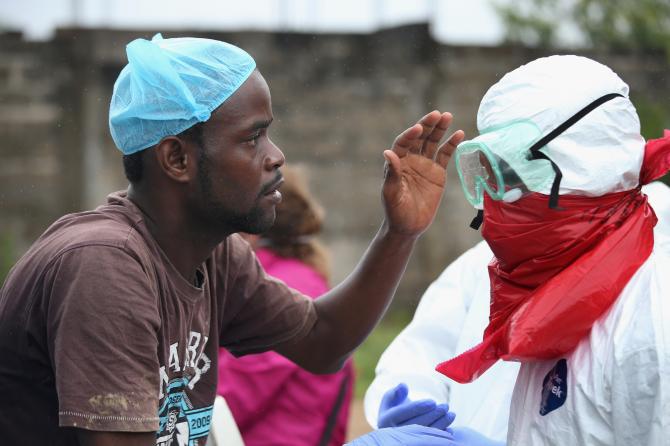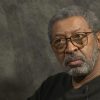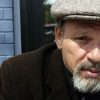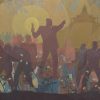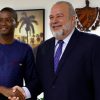
Ebola had been on blast since the spring, but despite the thousands of West Africans dying from it, few in the U.S. thought seriously that it would ever hit American shores.
Then 42-year-old Liberian national Thomas Eric Duncan arrived in Dallas, dispelling any notion that the often fatal virus wouldn’t cross the Atlantic. Now Americans are paying a lot more attention, with many wanting more intel (pdf) on what’s happening in distant Liberia, Sierra Leone and Guinea. That’s placing greater spotlight on the efforts of Western-led assets on the ground, from humanitarian doctors and missionaries to the recently deployed 3,000 U.S. military personnel sent to contain the disease.
The Take turned to University of California, Los Angeles, African-American-studies and Diaspora experts Peter James Hudson (pdf) and Jemima Pierre to offer insight into how effective that strategy is, whether it’s too militarized and if pharmaceuticals are calling the shots. Hudson’s dissertation,“Dark Finance: An Unofficial History of Wall Street, American Empire and the Caribbean, 1889-1925,” is under review, and Pierre is author of The Predicament of Blackness: Postcolonial Ghana and the Politics of Race.
Jemima Pierre (@BLK_DIASPORAS): No matter the scale or severity of the outbreak, the Cuban response should be contrasted with that of the U.S. and Europe. The Cubans have announced that they are sending an additional 300 doctors and nurses to Sierra Leone, Guinea and Liberia to combat the spread of and to help those infected with Ebola. In total, the Cubans will have 461 health care professionals in West Africa combating Ebola. This needs to be contrasted with, on one hand, the military response of the U.S. government and, on the other, the commercial response of American corporations like GlaxoSmithKline PLC who are fast-tracking approval of what will become, undoubtedly, an extremely profitable vaccine.
Peter James Hudson (@darkfinance): For those who have been paying attention, the militarization of the Ebola response is not surprising. What’s not talked about much is the U.S. militarization of the African continent long before Ebola and the presumed threat of Boko Haram. The U.S. established AFRICOM (the U.S. Africa Command) under President George W. Bush back in 2008 for a number of reasons—not least of which, to be prepared for the “threat” of China as it positions itself in the continuous scramble for African resources. But under Bush, few African countries wanted to host a U.S. military base, with the notable exception of Liberia’s president, Ellen Johnson Sirleaf. Under President Barack Obama, AFRICOM’s presence on the African continent expanded exponentially, and the U.S. has a military presence (often under the cover of “humanitarianism”) in just about every African country.
JP: We honestly think the Western response is racist and that the U.S. is acting in bad faith. The consistent privileging of white U.S. and European health care workers and missionaries needs to be seen as part of a broader context of racist practices around Africa in general, and the Ebola epidemic in particular. In the first case, one could accept the excuse that ZMapp is experimental and manufacturers didn’t want to give it to Africans for a number of historical and ethical reasons, including the long history of medical experimentation on people of color. But then we find out that Dr. Sheikh Umar Khan, a highly skilled and respected Sierra Leonean medical practitioner [who succumbed to Ebola], was not even told about the experimental vaccine or given the chance to make a decision on taking it. It must also be noted that the one U.S. citizen that was said to have died of the disease was a black man, Patrick Sawyer, a Liberian American who had been working as a consultant to the Liberian government.
PJH: Even if we put aside the discussion of a lack of “infrastructure to facilitate vaccination,” when it comes to dealing with Africa, especially around epidemics, the optics look bad because the operations, quite simply, are racist. Given the history of U.S. racist representations of Africa, their cover was egregious. But then you see highly skilled African professionals like Dr. Khan and Dr. Olivet Buck allowed to die, and white missionaries are saved.
JP: We find it dishonest when those in the West withholding vaccinations for Africans are claiming that they do not want to “experiment” on black African populations. There’s documented proof of experiments on African populations by Western pharmaceutical companies. Africans are well-aware of this history. And that history, along with the white West’s actions around Ebola, may also explain why many are questioning why this disease just suddenly emerged, and why there was already a secret vaccine in the works.
Charles D. Ellison is a veteran political strategist and regular contributor to The Root. He is also Washington correspondent for the Philadelphia Tribune and chief political correspondent for Uptown magazine. Follow him on Twitter.

